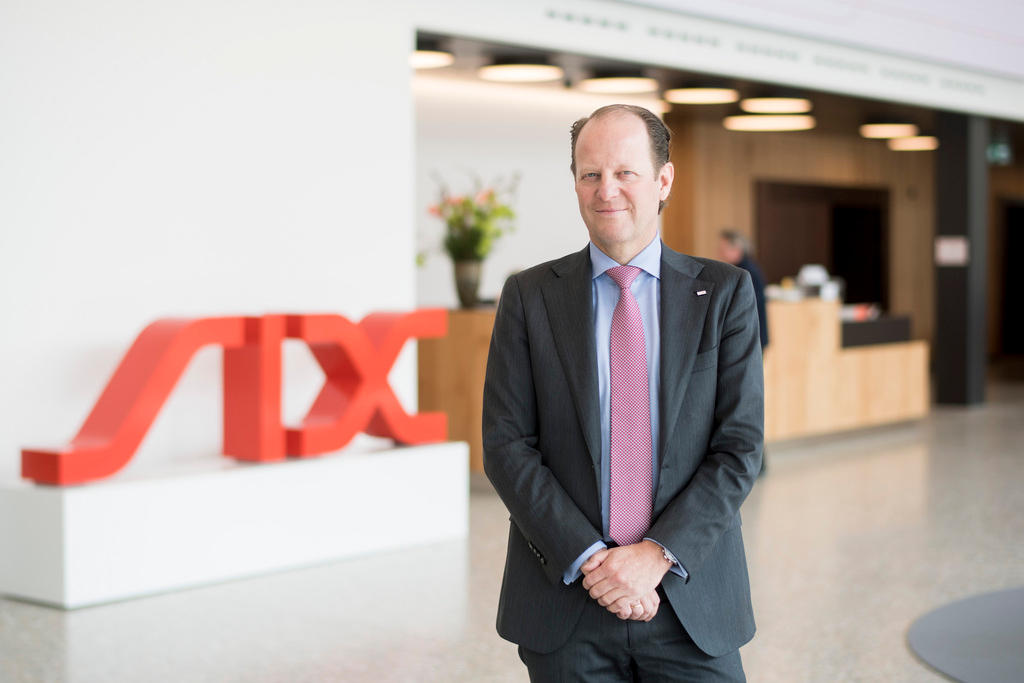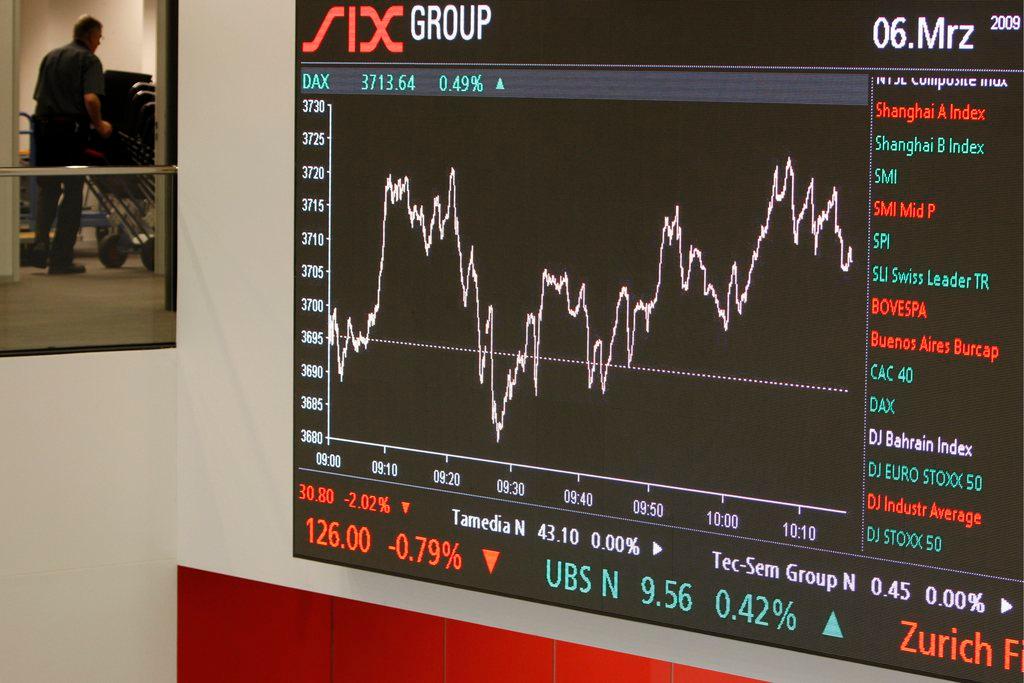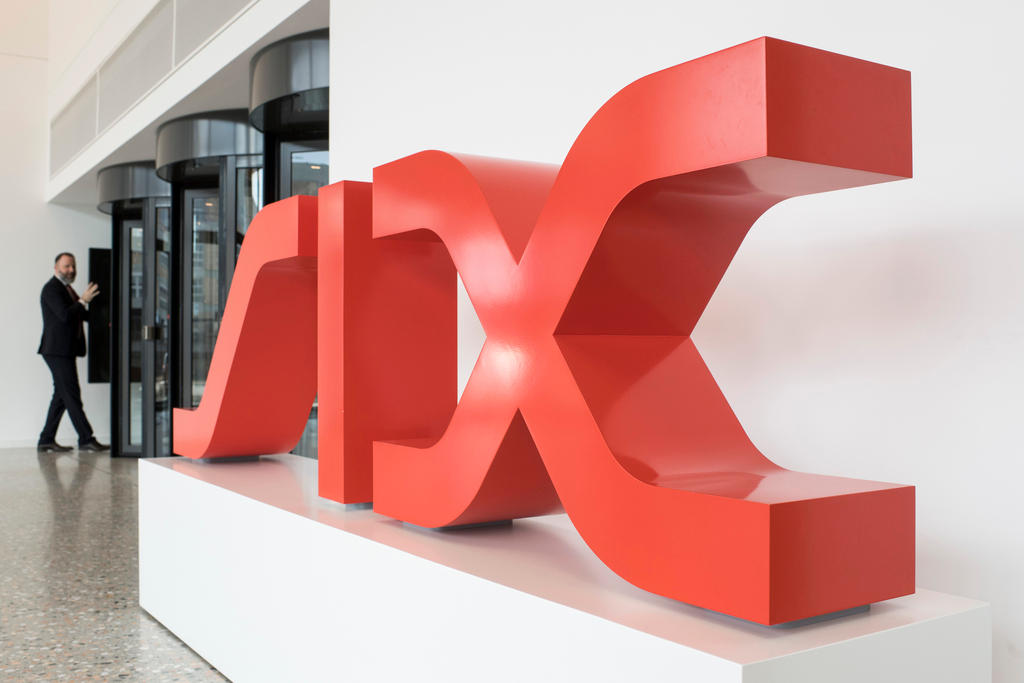Why the Swiss stock exchange is gearing up for cryptoasset era

The Swiss stock exchange is just one of several trading platforms gearing up for an anticipated wave of cryptoasset trading. So what’s behind this move?
The SIX GroupExternal link, which runs the Swiss exchange, is one of the front-runners in a race to build a blockchain-style distributed ledger platform that is required to trade such assets.
Distributed ledger technology (DLT), which includes blockchain, promises a number of efficiencies: faster, cheaper trading, a reduction in paperwork and the option of issuing numerous tokens to each security. Dividing ownership rights of high value assets, such as real estate, would lower financial barriers for smaller players to invest and small and medium sized enterprises (SMEs) to more easily issue shares.
Things have moved on since bitcoin and the initial coin offering (ICO) crowd investing wave burst onto the scene. The new kid on the block is the security token, a digital representation of asset ownership.
A security token is encrypted digital code that shadows financial instruments such as shares, bonds or even real estate and art. Tokens are a coded marker of who owns the underlying security and can be passed directly from one person to another, with each transaction recorded on the blockchain, or other forms of DLT.
swissinfo.ch fintech coverage
Fintech is changing the face of global finance. From bitcoin to blockchain, the Swiss financial centre is gearing up to the challenges and opportunities of the new wave of digital technology. The blockchain innovation is touching practically every industry, from logistics to energy, commodities trading and transport.
Big players move in
Until recently, cryptoassets have been the domain of a growing number of independent, largely unregulated exchanges. But with the arrival of tokenised securities, big national stock exchanges are now moving into position.
SIX Group announced in July that it is building a “fully integrated end-to-end trading, settlement and custody service for digital assets” that will start to be rolled out in mid-2019. DLT will enable trades, clearing, settlement and custody carried out in one stroke, saving time and cost. The platform will also host a new form of tokenised company share that would allow smaller firms to more easily raise capital by listing.
The Stuttgart stock exchange, Germany’s second largest platform that also owns Bern’s stock exchange, is poised to launch the “Bison” app for cryptocurrency trading through a subsidiary and will follow this up with a “multilateral trading venue for cryptocurrencies and tokens”.
Intercontinental Exchange, which owns a number of platforms including the New York Stock Exchange, is part of a consortium that plans to launch the Bakkt exchange to “unlock the transformative potential of digital assets across global markets and commerce.”

More
Swiss stock exchange to create cryptoasset trading platform
The Stock Exchange of Thailand plans to become the regional leader in Asia with a new regulated digital exchange as an “alternative venue for fund-raising and investment opportunities”.
Shanghai, London, Frankfurt, Australia, Singapore, the United Arab Emirates, Malta and Gibraltar are also among those in the race to upgrade at least parts of their trading services with DLT to tap into the nascent “token economy”. Next year will see the launch of some such exchanges.
What will this look like in future?
The big exchanges are currently jostling for early adopter advantage, but the new technology has yet to be put to the test at scale. SIX says it will start rolling out its platform by the end of next summer, offering a limited range of as-yet-to-be-defined services to start with. No-one wants to be left behind, but equally, no-one wants to move too fast and make a mistake.
Daniel Diemers of PwC Strategy&, which advises SIX, says that it makes sense to offer the entire trading value chain under one roof. “Traders don’t want to go to 10 different venues for matching trades, clearing and settlement etc,” he told swissinfo.ch. “They will want the whole package at one venue, professionally executed.”
One of the potentially profitable business lines could be providing quality, real-time market data services for this new form of trading, Diemers believes. Charging subscription fees to gain access to data feeds or providing specialised risk management services could prove a lucrative side line.
But one of the potential stumbling blocks to fast adoption is that regulation is still lagging behind technological advances. For example, technology allows ownership of assets to be tokenised and freely passed around independent of the security itself, but this has yet to be codified in law. This is something the Swiss government is looking to change.
Different countries are taking their own approach to regulating the token economy. Liechtenstein is in the process of creating a new blockchain law while Switzerland appears to be veering down the route of updating existing legislation to incorporate cryptoassets.
Where would this leave the independents?
According to PwC, the ten largest global crypto exchanges currently control around 70% of daily trading volume in cryptoassets. In Switzerland, exchanges include Taurus, Swiss Crypto Exchange SCX and LykkeExternal link, which recently partnered with Dutch trading platform Nxchange.
Diemers believes that the arrival of national exchanges could see a consolidation, with some mid-sized independents either going out of business or merging with the heavyweights.
However, Swiss digital assets firm Taurus is of the opinion that digital versions of national exchanges won’t have it all their own way. Taurus GroupExternal link co-founder Lamine Brahimi says there is room for all types of exchanges and potential opportunities for collaboration between different types.
“The digital assets market is quite diverse and segmented and there is room for incumbents and new players,” Brahimi told swissinfo.ch. “You also need access to the right skills, knowledge and technical infrastructure.”

More
Switzerland sets legal foundations for blockchain industry
For a start, institutional antipathy to cryptocurrencies will place them at a disadvantage to embracers of bitcoin, Brahimi said. But he admits that any exchange will need regulatory approval if it is to flourish in the long run. “There is strong demand from institutional investors [banks and asset managers] for truly regulated digital assets exchanges applying to the highest institutional standards,” he said. “So far, there are none.”
To this end, Taurus is applying to the Swiss financial regulator for a broker-dealer license.
Who else stands to gain?
Security token advocates believe that this technology will transform the financial markets, allowing more people to raise capital and trade in a faster, more cost-effective way.
This would open the door to a range of players beyond exchanges. If all goes to plan, small and medium sized companies (SMEs) would be able to easily issue shares and raise money for expansion. The increased volume of trading could also benefit banks and asset managers that derive fees from placing trades on behalf of clients or trade their own assets.
A number of specialised financial players are setting up in Switzerland to catch the token economy wave. These include MelonportExternal link, a portal for asset managers to engage in cryptoasset trading, tokenised alternative asset provider Smart ValorExternal link and InstimatchExternal link, which is exploring blockchain options for its digital platform that matches borrowers and lenders in the corporate debt market.
Distributed Ledger Technology (DLT)
DLT is a digital system for keeping records of who owns particular assets and making sure the books balance when they change hands. It is designed to replace centralised accounting systems run by banks and government agencies etc.
DLT does this by allowing everyone within the system to view and approve transactions. The system stores the complete history of all transactions on an encrypted digital ledger, which is visible to all participants. Blockchain, the basis for decentralised cryptocurrencies such as bitcoin, is one form of DLT.

In compliance with the JTI standards
More: SWI swissinfo.ch certified by the Journalism Trust Initiative













You can find an overview of ongoing debates with our journalists here . Please join us!
If you want to start a conversation about a topic raised in this article or want to report factual errors, email us at english@swissinfo.ch.